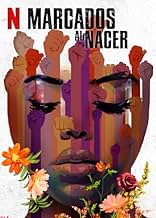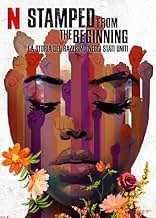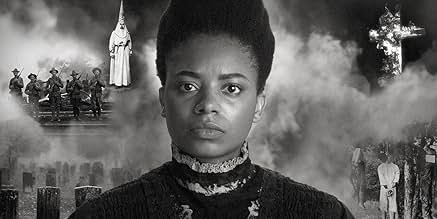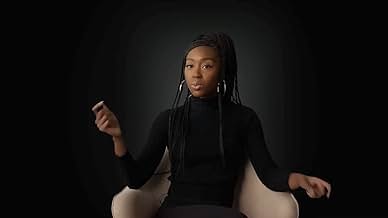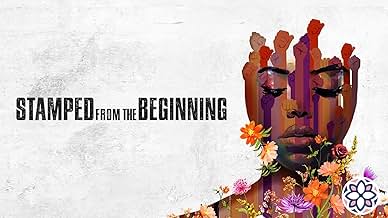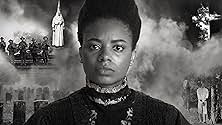ÉVALUATION IMDb
6,7/10
1,4 k
MA NOTE
Jalonné d'animations innovantes et d'avis d'experts, ce documentaire inspiré du best-seller lauréat de plusieurs prix explore l'histoire des idées racistes aux États-Unis.Jalonné d'animations innovantes et d'avis d'experts, ce documentaire inspiré du best-seller lauréat de plusieurs prix explore l'histoire des idées racistes aux États-Unis.Jalonné d'animations innovantes et d'avis d'experts, ce documentaire inspiré du best-seller lauréat de plusieurs prix explore l'histoire des idées racistes aux États-Unis.
- Nommé pour 1 prix Primetime Emmy
- 2 victoires et 10 nominations au total
Leer Leary
- Abraham Lincoln
- (voice)
David Goldstein
- Boston Elite
- (voice)
Histoire
Commentaire en vedette
I quite like Kendi's book, and when I saw this pop up on Netflix I clicked it instantly, looking forward to see a documentary visualize the content of the book in an engaging manner.
Sadly, it's honestly harder to follow than expected, even for someone who has read the book. Williams' direction led to extreme over-editing, and the lack of captions or context for what you are looking at in the montages leads to frequent confusion and annoyance.
To be clear, I understand the logic behind Williams' editing style--but it still doesn't work. What he was going for was to try to amplify the continuities of 17th century racism to racism today, which is fitting with Kendi's main thesis. But in terms of documentary style, it goes a little 'too extra' even to that end, mixing together speeches, films, historical footage, contemporary news footage, highly stylized reenactments... to the extent that at any given montage, you could go a solid three minutes not being sure what CENTURY the footage you're looking at is coming from, let alone decade, or whether it was real footage or fiction.
If you were an educator, and wanted to have a conversation about Kendi's ideas, but hadn't assigned the full book, should you show this to your class instead? No, absolutely not -- this documentary will be annoying and confusing if you aren't already familiar with Kendi's point, and honestly, even if you agree with Kendi's thesis you might even then find much to dislike.
For instance, consider the 7 minute sequence from about 11 minutes into the documentary to the 18 minute mark, on Bacon's rebellion. Could your students answer the following questions: -What century was Bacon's rebellion in?
-What was Bacon's rebellion about?
-What was the outcome of Bacon's rebellion?
No--because Bacon's rebellion is just an incident mentioned in support of the idea that whiteness was invented to prevent poor whites from allying with poor blacks. You might be able to follow the point the documentary is trying to make, but the result is that, unless you already know the example, you would completely lose sense of historical trajectory or continuity because the documentary tells you so little contextualized information.
Now you might say--oh they didn't have time to go into all this context on the example. But they used two minutes right after introducing Bacon's Rebellion to give a four-century spanning montage of depictions of racism... instead of giving almost any basic context about the example of Bacon's rebellion or its relevance to the argument.
A lot of the montages, for that matter, feel... conspiratorial? What I mean by this is that again, they're not really making articulated connections; they're not even naming the people in the photos, so either you 'get it' or you don't--but isn't the point of a documentary to make it so that people unfamiliar with the subject will understand? There's no names given when someone's face pops up on screen, and the faces and names go by so fast even someone highly educated is likely to be left wondering "wait who was that guy..?"
Basically, even in a classroom setting where you had already read Kendi's book... I honestly feel like this documentary would do more harm to comprehension than good.
Sadly, it's honestly harder to follow than expected, even for someone who has read the book. Williams' direction led to extreme over-editing, and the lack of captions or context for what you are looking at in the montages leads to frequent confusion and annoyance.
To be clear, I understand the logic behind Williams' editing style--but it still doesn't work. What he was going for was to try to amplify the continuities of 17th century racism to racism today, which is fitting with Kendi's main thesis. But in terms of documentary style, it goes a little 'too extra' even to that end, mixing together speeches, films, historical footage, contemporary news footage, highly stylized reenactments... to the extent that at any given montage, you could go a solid three minutes not being sure what CENTURY the footage you're looking at is coming from, let alone decade, or whether it was real footage or fiction.
If you were an educator, and wanted to have a conversation about Kendi's ideas, but hadn't assigned the full book, should you show this to your class instead? No, absolutely not -- this documentary will be annoying and confusing if you aren't already familiar with Kendi's point, and honestly, even if you agree with Kendi's thesis you might even then find much to dislike.
For instance, consider the 7 minute sequence from about 11 minutes into the documentary to the 18 minute mark, on Bacon's rebellion. Could your students answer the following questions: -What century was Bacon's rebellion in?
-What was Bacon's rebellion about?
-What was the outcome of Bacon's rebellion?
No--because Bacon's rebellion is just an incident mentioned in support of the idea that whiteness was invented to prevent poor whites from allying with poor blacks. You might be able to follow the point the documentary is trying to make, but the result is that, unless you already know the example, you would completely lose sense of historical trajectory or continuity because the documentary tells you so little contextualized information.
Now you might say--oh they didn't have time to go into all this context on the example. But they used two minutes right after introducing Bacon's Rebellion to give a four-century spanning montage of depictions of racism... instead of giving almost any basic context about the example of Bacon's rebellion or its relevance to the argument.
A lot of the montages, for that matter, feel... conspiratorial? What I mean by this is that again, they're not really making articulated connections; they're not even naming the people in the photos, so either you 'get it' or you don't--but isn't the point of a documentary to make it so that people unfamiliar with the subject will understand? There's no names given when someone's face pops up on screen, and the faces and names go by so fast even someone highly educated is likely to be left wondering "wait who was that guy..?"
Basically, even in a classroom setting where you had already read Kendi's book... I honestly feel like this documentary would do more harm to comprehension than good.
- ArgonReviews
- 19 nov. 2023
- Lien permanent
Meilleurs choix
Connectez-vous pour évaluer et surveiller les recommandations personnalisées
- How long is Stamped from the Beginning?Propulsé par Alexa
Détails
- Date de sortie
- Pays d’origine
- Site officiel
- Langue
- Aussi connu sous le nom de
- Stamped from the Beginning
- Lieux de tournage
- sociétés de production
- Consultez plus de crédits d'entreprise sur IMDbPro
- Durée1 heure 31 minutes
- Couleur
- Mixage
Contribuer à cette page
Suggérer une modification ou ajouter du contenu manquant

Lacune principale
What is the Hindi language plot outline for Racisme: Une autre histoire de l'Amérique (2023)?
Répondre

